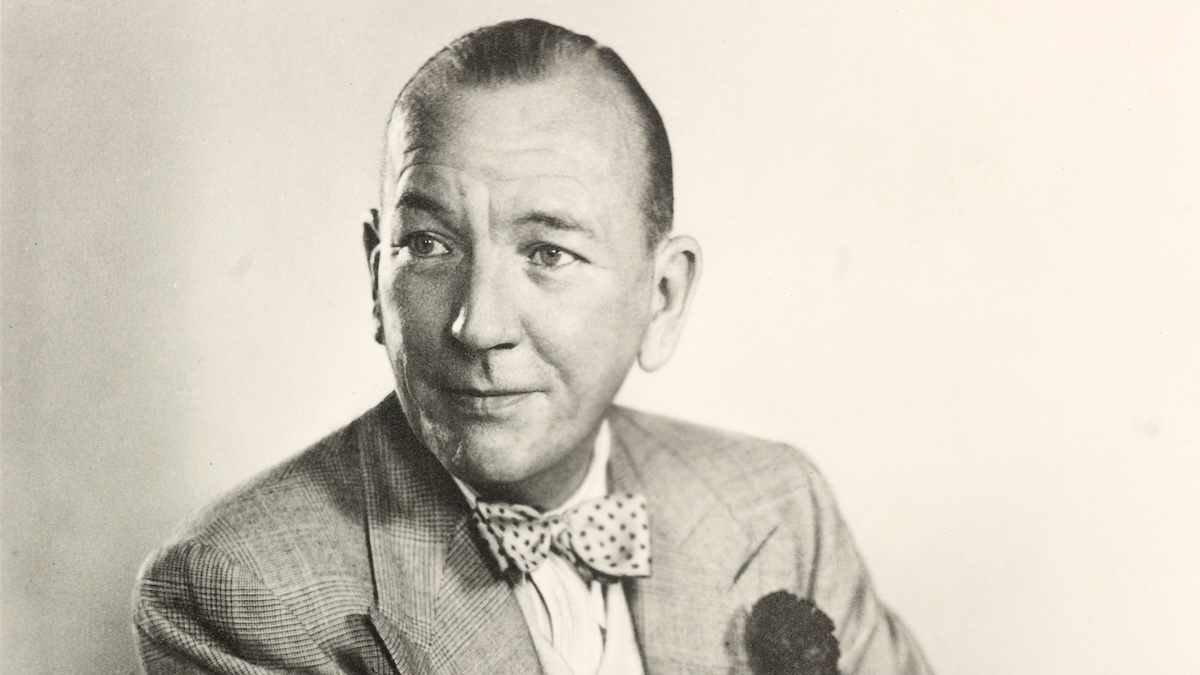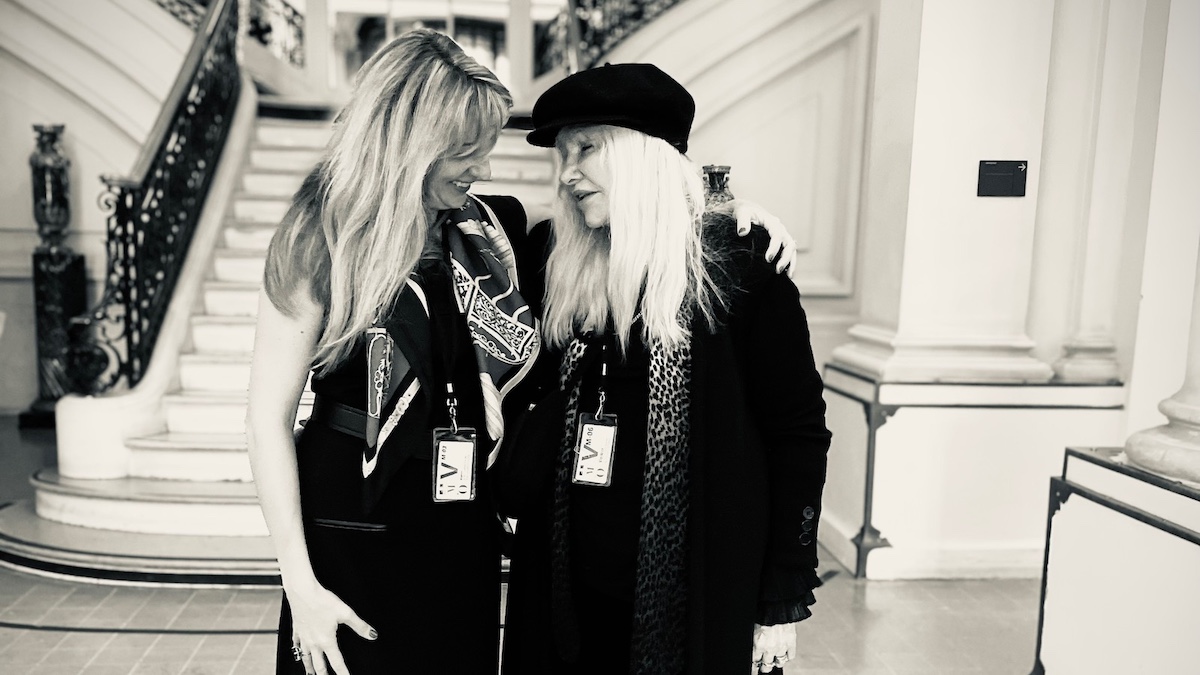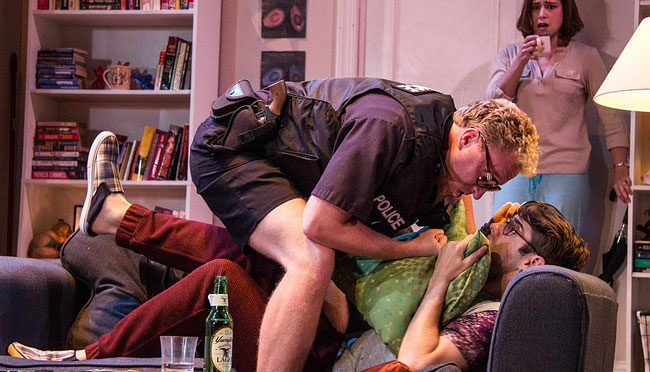
We’re proud that Samuel French totes a robust staff of theatre lovers, advocates, and practitioners who have a theatre life as active outside the office as they do in. Our Literary Supervisor, Ben Coleman, sat down to discuss this balance with one of our own: Licensing Manager, David Kimple.
When he’s on the clock, David is busy helping theaters program their seasons, but out of the office, David is a playwright bent on reinventing comedy, exploring structure, and writing in commercial and non-conventional veins. We may be a little biased, but we think that David is a playwright on the rise and what’s more, we’re delighted to work with and represent him as a playwright. Take a read below to learn more, and be sure to check out his plays, MMF and Who Is Theo?.
Ben Coleman: Let’s jump right to the heart of your art. What turns you on as a playwright?
David Kimple: I’m very attracted to a variety of theatrical experiences. As an audience member, I love the crazy, immersive stuff that you see but then have no idea what you just saw, and I love straight-up comedy that’s really commercial. I also, of course, love a good musical. All of that stuff as a theatre participant is super engaging and inspiring to me. As a playwright and creator, I find that it’s a really interesting time to be in the industry. There are a lot of things that the theatre world seems to need: stories by people of color, varying genders, different abilities. I absolutely want to create work that is inclusive and progressive, I hope that goes without saying, and I have to think, “What is honest and what is there for me – as a blue-eyed, brown-haired, Caucasian, man – to talk about that our community needs right now?”
Ben: How do you wrestle with that?
David: Right now I’m searching for stories that are intelligent and outwardly funny. Perhaps surprisingly, it’s not trendy to write comedies right now. I see a lot of plays that have something wonderful and kitschy for a moment, but then that moment is over and the play takes on a new tone. So later, after we’ve seen the play, we have to qualify it as being a “dark comedy,” or some such variation. I really love the idea of playing with comedy that identifies as comedy, because the commercial and social value of great comedies is so high and yet so underappreciated. My “Broadway dream” is that I will be able to reinvent the comedic genre’s wheel in some capacity. I – obviously – haven’t done it yet.
Ben: But stay tuned. What does it look like to “reinvent the comedic wheel” as you said?
David: I don’t know that I have an answer to that yet. I’m hunting for it. The way that I’m working these days is very simple at the start. I try not have a couch for example. Lights up: there are no couches, no living rooms, no family dinners. Now how do we write a comedy that feels like a comedy without those elements? And really, how many comedies don’t have one of those things in some capacity? I know there are great examples, but it’s an interesting challenge!
Ben: That’s really interesting, because when we think about comedy, most people think “plays that make you laugh.” But on a very structural level, comedy is really about a state of chaos returning to a state of order.
David: Totally. Ken Ludwig, who is a master of comedy in his own right, talks about the mathematics of a comedy, and the intelligence that goes into it. It’s a difficult thing to shed new light on, and I think one reason is because comedy is brought to us in a formula, mathematically, and the way we watch a comedy – and most musicals as well – is so ingrained. I think that in drama we allow a little bit of a different arc these days. When it comes to comedy, if the mathematics are broken, even though the equation might equal the same thing, if we’re not following the same pattern that we usually do, people don’t know how to react and therefore it doesn’t feel the same way. It doesn’t feel funny. When you break the form, it “doesn’t work.”
I’m a big fan of catch phrases, and one I’ve always said is “use the system to abuse the system.” You have to know the mathematics and the foundation of things in order to expand away from it.
WHO IS THEO? at Bristol Valley Theater. Credit: Rich Miller.
Ben: Slightly switching gears, where is the healthy intersection of David the Licensing Manager and David the Playwright?
David: The wearing of all the hats is one of my favorite things in the world. I’m inexpressibly grateful to be published by French and to be a Frenchie on the licensing team. I guess sometimes it’s a little difficult working here and having my shows also published here, but even I can see my own eyes rolling about how much of a problem that isn’t. It’s a bit strange to know when to talk about my own shows and when not to. So I have rules. Rules and deadlines are good for me as a writer.
Ben: You mention rules; can you give an example?
David: An example is, if I’m going to talk about my shows, it has to be exactly the right circumstance or it has to be brought up by somebody else in the office. I’ll bet we could go in circles about whether or not the rules are necessary, but it’s a personal preference.
Ben: So many administrators are also artists of one sort or another. It’s a big perk to be able to stay in that world during your day job, if you can swing it.
David: It’s not an unusual thing for folks in our industry to wear different hats at all. There are even agents and folks at other licensing houses that are playwrights. We can’t turn off the need to create. In fact, that need to create is often the reason we found our way into this leg of the industry. And I think that’s a beautiful thing. One of my favorite things about working in the theatre is that people overlap in different ways.
Ben: Do you feel like your career at Samuel French has informed your playwriting?
David: Absolutely. I will say that I am very fortunate because Samuel French allows me to see shows and communicate with other writers as I’m writing. Not to mention the privilege of connecting with theaters all over the country about what they want to program.
That is one of many reasons that I’m drawn to writing new comedies. I keep hearing all these theaters say “we need commercial comedies” and hearing such an explicit need for their programming is certainly illuminating.
Ben: That’s really interesting to see how theatrical licensing has colored your perspective as a writer. It’s not a point of view that many playwrights get to see.
David: You know, we’re a theatre business and I have a little bit of commerce-brain, so when it comes to writing I’ve simply built myself a bridge. I often ask myself “am I satisfying a need with my product?” So, there’s a part of me that wants to lean into the commercial market…and there’s also the part of me just wants to write an existential Martian play. So who knows.
Ben: I have to mention, that you’ve also championed after-work writer groups with the other playwrights on the staff. It’s wonderful.
David: Aw, thanks. Everyone in this company is here because we are theatre people first, and that doesn’t go away when you’re working for a business. You can wear as many hats as you want, but at the end of the day we need to collaborate. If I’m going to be a playwright, I want to know what my contemporaries are writing, and I want to know how they’re producing it, and I want to know what it looks like, and I want to know how it feels. I think the simple way of saying it is art breeds art. So, if we engage one another and see how passionate we are, it’s cyclical, it’s intoxicating, and it’s inspiring.

Noël Coward’s Travels

Kate Chopin in New Orleans: Mother-Daughter Author Duo Collaborate on Historical Book


